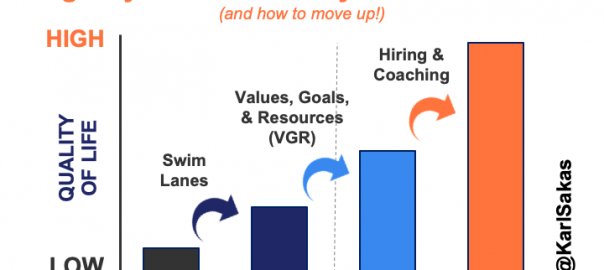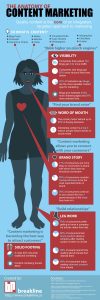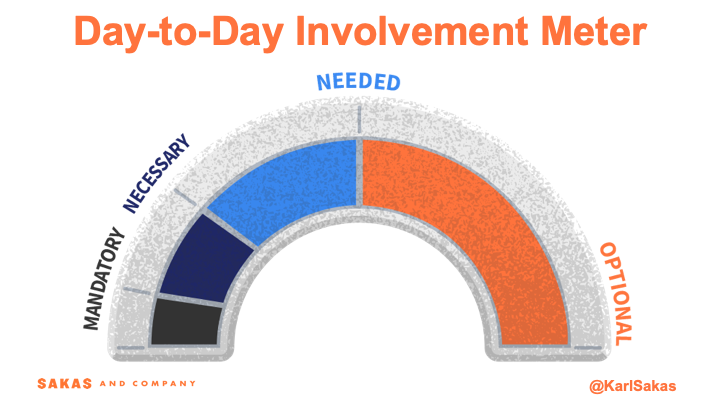
Consider your current day-to-day stage: Mandatory, Necessary, Needed, and Optional?
Wondering about your evolution as an agency owner? The biggest indicator is what you do on a day-to-day basis.
When you started, you were doing everything. As you’ve grown, you’ve built a team, and perhaps eventually sub-teams. But it’s hard to shake old habits—and what worked a year or two ago might not work today.
The solution? See where you fit on what I call the “Day-to-Day Involvement Meter” (right). And if you want to upgrade your spot, read on for my advice to move forward.
When you make yourself “Needed but not Necessary” as a manager, your team still needs you for long-term direction and sign off on big decisions. But you’re not necessary for every decision—your team can make decisions without you, and they’re generally good decisions.
That means you have time in your schedule to think strategically about your agency, and take a week or two off each year, without interruption. It means you’re making an above-market salary, and working reasonable hours, so that you can have a life outside of work.
Being Needed doesn’t mean you disappear forever. You still define the vision, choose long-term company goals, reinforce the culture, and so on. But you can set it, and forget it… for a week or two at a time.
The Day-to-Day Involvement Meter: The Four Stages of Leading an Agency
Expanding on the original idea, I’ve found that agency owners fall into four stages based on their day-to-day responsibilities as an agency leader:
- Mandatory
- Necessary
- Needed
- Optional
Let’s look at each of these a little more closely. As you look through these, think about which one you are now… and which one you want to be.
Stage 1: MANDATORY
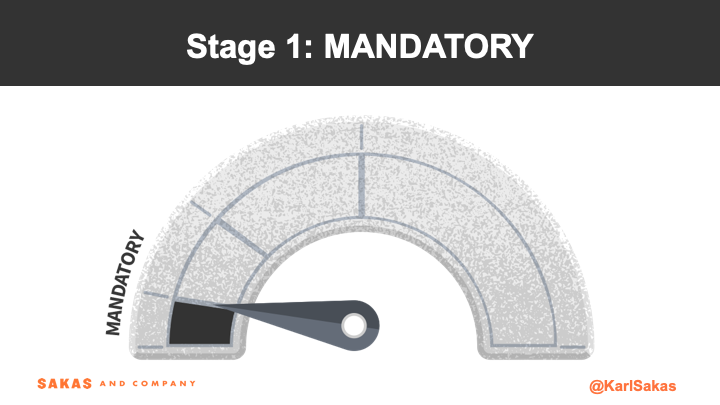
Initially, you’re MANDATORY day-to-day. This means your team can’t function without you… and you never can get away from the agency.
I call the first stage Mandatory. In this terrible stage, you are Mandatory to your team’s day-to-day decisions.
Here are some signs that you might be in the Mandatory stage:
- You can’t get away for a DAY without something going wrong, much less a few days, and you certainly can’t take a real vacation.
- You’re interrupted all day long, by both employees and clients. You’re probably the primary contact for many, if not most, of your clients because your team can’t handle them.
- You’re so Mandatory, it feels like you can never get your important work done, because you’re constantly fighting fires at your agency.
- You rarely each lunch on time… or if you do, the meal tends to involve frantic multitasking and indigestion.
- Your significant other has stopped asking if you’ll be home late.
At this point, you’re likely barely profitable—or even unprofitable. And you’re certainly underpaid for the workload, stress, and negative impact on your life.
But there’s hope—when you move up from Mandatory to Necessary.
Stage 2: NECESSARY
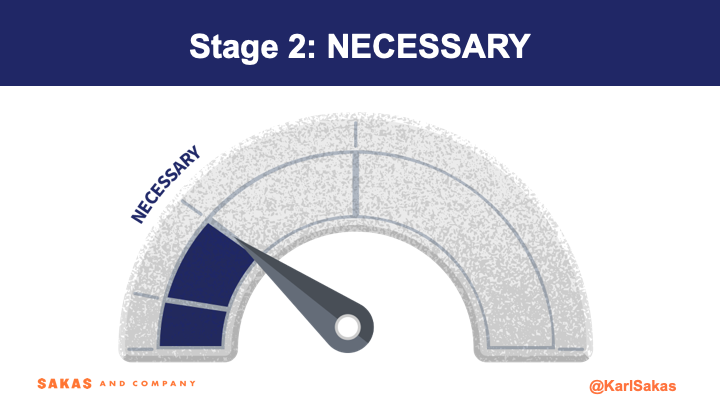
Then, you become NECESSARY day-to-day. Your team is starting to make decisions without you… but you often have to come back and fix things.
The second stage on the Day-to-Day Involvement Meter is Necessary. Many agency owners work at this stage, but it’s not a fun place to be.
When you’re Necessary, you’re no longer Mandatory to your team’s day-to-day decisions, but you’re still pretty involved in the day-to-day.
Here are some signs you might be Necessary:
- Even when you’re not the primary client contact, you’re still dragged in for firefighting a LOT (more than once or twice a week).
- Your team is making decisions without you, but they’re often BAD decisions… and then you have to fix them.
- You might be able to take 2-3 days off, but a week or more seems impossible. And the idea of time off without checking email? No way.
Your agency is likely profitable (up somewhat from Mandatory). Assuming you’re appropriately staffed, your net profit margins are likely below the 20-30% healthy-agency benchmark.
If you can make the jump from Necessary to Needed, you’ll see a huge improvement to your quality of life.
Stage 3: NEEDED
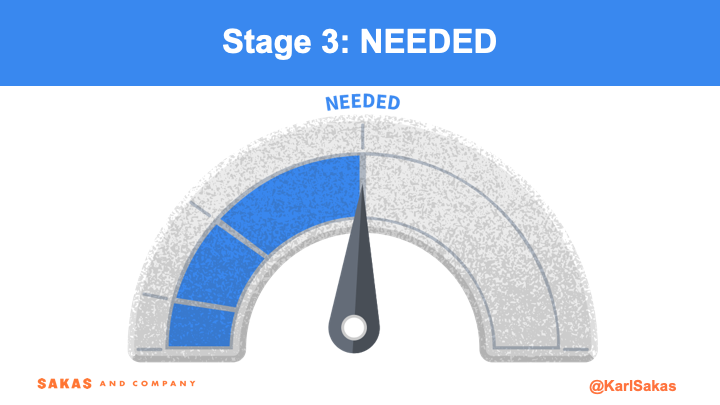
Many agency leaders want to make themselves NEEDED. Most things run smoothly, and you’re not Necessary to your agency’s day-to-day functioning.
When you make yourself Needed not Necessary, things start feeling a lot better. This is the stage most agency owners seek to achieve.
When you’re Needed not Necessary:
- Your team is making decisions without you… and they’re generally GOOD decisions.
- You can take a week or two off, without interruption. (It might take a couple tries, but you’ll get there.)
- You’re not stressed out all the time; when you are stressed, you appreciate that it’s not constant like it used to be.
- You can think strategically about your agency’s future, and about how to ensure the business serves you, and your family, and your employees, and their families.
Needed doesn’t mean you disappear forever, or that you can now work just two hours a week. You still need to set the vision, set long-term company goals, reinforce the culture, and so on. But you can set it, and forget it… for a while.
Most agency leaders stop here, at Needed. If you’re happy with a one- or two-week vacation, that’s fine. And if you’re happy making a slightly above-market salary, you can stay at Needed. But some people want to go further…
Stage 4: OPTIONAL
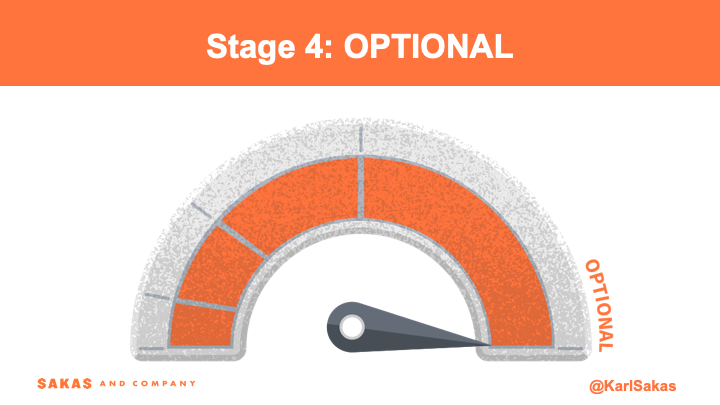
Finally, you can make yourself OPTIONAL day-to-day. Your agency can run without you… and you can enjoy a strong quality of life.
The fourth stage is to make yourself Optional from a day-to-day perspective.
What does that look like? Well, I helped a client in Canada get there earlier this year. She came back from a five-week honeymoon and realized… she’d MADE herself optional and she was bored. She exited, and she’s now happily running a brand new startup.
Another client started at Mandatory a few years ago. I helped her move to Necessary and then Needed, and now increasingly Optional. She takes a one-month sabbatical every year, while reporting that she’s on track for record revenue and bottom-line growth.
For some agency owners, Optional means they have someone else running everything day-to-day, and they just do the fun stuff (however they choose to define their fun). For others, it means they can sell their agency—and negotiate a deal where they don’t have to stick around forever—because, after all, they’re now Optional.
How Your Day-to-Day Impacts Your Quality of Life

Your quality of life improves as you move up along the Day-to-Day Involvement Meter.
Looking over the four stages of Day-to-Day Involvement… Where are you today? And, just as important—where do you want to be?
Most agencies owners are at either the Necessary or Needed stage. Some are Mandatory, especially in the first couple years of business. And a small cohort are happily “Optional.”
As you move up the Meter, your Quality of Life tends to improve. Wondering how to make that happen? Read on!
How to Improve Your Quality of Life by Moving Up a Stage
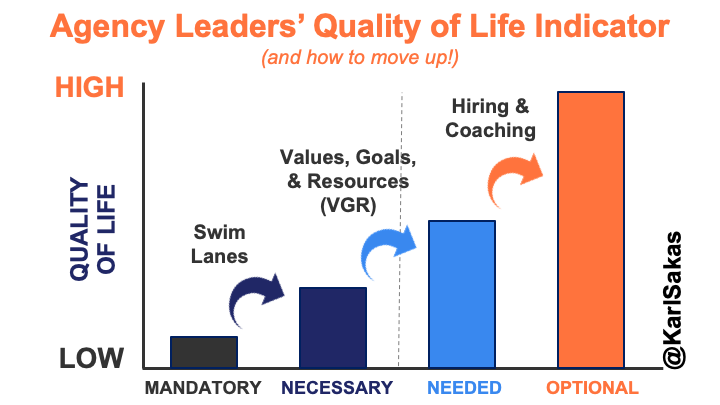
Ready to improve your quality of life as you move up each stage on the Day-to-Day Involvement Meter? Consider Swim Lanes; Values, Goals, and Resources; and Hiring & Coaching.
No matter your spot on the Day-to-Day Involvement Meter, the process for improving follows the same basic strategy.
That is, you’ll identify your current stage, set a goal for your next stage, create a plan to make the shift, execute the plan, and adjust based on the results.
As you prioritize, consider that certain techniques tend to make a big impact at certain steps. Specifically:
- Go from Mandatory to Necessary: Set and communicate the Swim Lanes your team should follow. This helps get things off your plate, while minimizing duplicate work.
- Go from Necessary to Needed: Ensure your team understands the relevant Values, Goals, and Resources (VGR)—because then they don’t need to ask you every time. This includes your agency’s VGR, your VGR (as the owner), and each client’s VGR.
- Go from Needed to Optional: This is about hiring & coaching—recruiting the right people, and then sharing ongoing guidance to support them on continuous improvement. For ideas, see my book Made to Lead: A Pocket Guide to Managing Marketing and Creative Teams (available in paperback and Kindle).
Moving up a stage takes time and effort… but I bet you’ll find the Quality of Life improvements are worth it!
Question: As an agency leader, what’s your current stage on the Day-to-Day Involvement Meter: Mandatory, Necessary, Needed, or Optional?
Business & Finance Articles on Business 2 Community
(34)
